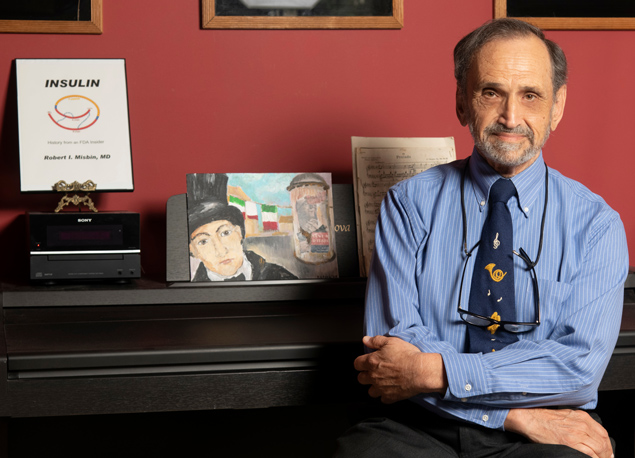September 24, 2021 by Elena Conway
Classical music has always been in Robert Misbin’s, Med ’71 (MD), life. Even while attending Johns Hopkins University School of Medicine, he would visit the nearby Peabody Institute years before it became affiliated with the university in 1977. And in retirement, Misbin dedicates part of his time to classical music and opera. He is cofounder of Partners for the Arts, an organization that supports young opera singers. He also helped establish a chamber music competition at Levine Music for players in the Washington, D.C., area.

This year, Misbin expanded his support to Baltimore. With an outright gift and a commitment from his estate plan, he formed the Misbin New Directions Ensemble for Peabody Preparatory’s Tuned-In program, which provides Baltimore City students with free musical education.
We talked with him to learn the story behind this gift.
Music has been an enormous source of enrichment from the very beginning. My parents loved opera. My mother let me use her record collection. I would play them on my own and, of course, being a child, I broke some of them. My parents put them back together with scotch tape. As the records went around on the turntable, I would hear the bump, bump, bump of the needle hitting the tape.
My daughter lives in Chicago and got me involved with the Chicago Metamorphosis Orchestra Program (ChiMOP). It’s an organization that provides instruments and music instruction to inner-city children there. Last year, I decided to expand my commitment. I asked ChiMOP’s director, Tom Madeja, what other organizations around the country he thought I might be interested in. He mentioned Peabody and said that its Tuned-In program was actually the model they used to develop the ChiMOP.
This year happens to be the 50th anniversary of my graduation from Hopkins, as well as the hundredth-year anniversary of the discovery of insulin. Research on insulin has been the focus of my scientific career, starting from when I was a medical student at Hopkins — I published a book last year entitled INSULIN – History from an FDA Insider. So now, in 2021, it felt like the stars were in alignment, pointing for me to start a new and important program.
I asked Dan Trahey, one of the founders of Tuned-In, ‘What do you want to do that you’re not doing now?’ Dan is a tuba player in classical music and jazz; I expected he wanted to do something along those lines. But he wanted to develop a string program, which really surprised me. He asked if I could think of any people of color who are major string players in classical music? And I admitted that I couldn’t.
The thought had occurred to me before. I was once a timekeeper for the Washington Performing Arts Society’s string competition. It’s for young musicians, often with tremendous talent, and it struck me that there were hardly any African American children playing string instruments. This is not the case in opera and in many other forms of American music. Dan felt that a string program would really make a tremendous difference in that regard in the Baltimore community.
By making an estate gift, I’ve made the commitment for the New Directions Ensemble to go on in perpetuity. The hope is to foster talent in string playing that might not have blossomed otherwise in Baltimore.
But the impact goes beyond string playing and even beyond the music itself. I think that there is real value in learning how to play an instrument, regardless of the kind of music you play and regardless of how good you are. Playing sports is recognized for its importance in developing discipline. Music instruction has the same effect. The goal is to give young musicians a sense of self-worth, and to teach them to understand what excellence is and how you can achieve great things by working with other people.
It makes a tremendous difference to be able to develop that talent in children who may have been disadvantaged in other aspects of life. It’s a way of giving back to the community.
Topics: Alumni, Parents, Peabody Institute, School of Medicine, Strengthening Partnerships, Support Scholars